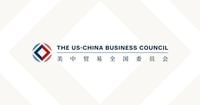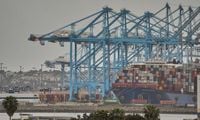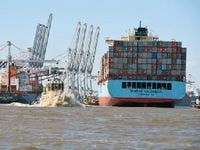The United States Trade Representative (USTR) has announced a series of bold measures aimed at curbing China’s dominance in maritime infrastructure, proposing tariffs of up to 100% on ship-to-shore (STS) cranes and cargo handling equipment originating from China. This significant action follows an extensive Section 301 investigation, which included a two-day public hearing and nearly 600 public comments from industry stakeholders.
The USTR's investigation revealed alarming vulnerabilities due to China's overwhelming control over the global production of essential maritime infrastructure components. Notably, China produces 95% of the world's shipping containers and 86% of intermodal chassis. Ambassador Greer underscored the importance of addressing these vulnerabilities, stating, "Ships and shipping are vital to American economic security and the free flow of commerce." He added that these actions aim to "reverse Chinese dominance, address threats to the U.S. supply chain, and send a demand signal for U.S.-built ships."
The new tariff proposal was unveiled alongside a revised port fee regime targeting Chinese-built ships, finalized on Thursday, April 17, 2025. Under this regime, Chinese ships will incur docking fees of up to $50 per ton for each voyage to the United States, with the fees set to escalate over the next few years. Initially, a 180-day no-fee period will apply, after which the fees will increase incrementally, reaching $140 per ton by 2028.
Industry stakeholders have until May 19, 2025, to submit written comments on the proposed tariffs, with a public hearing scheduled for the same day at the U.S. International Trade Commission in Washington, D.C. The USTR is particularly interested in feedback regarding the product scope, appropriate duty rate levels, and implementation timelines ranging from 180 days to 24 months.
This move follows the previous Biden Administration's imposition of a 25% tariff on Chinese-manufactured STS cranes, a measure designed to combat what officials described as unfair trade practices and to mitigate cybersecurity threats associated with Chinese-manufactured port equipment. Notably, Shanghai Zhenhua Heavy Industries (ZPMC), a major supplier of STS cranes with close ties to the Chinese Communist Party (CCP), has come under increased scrutiny due to concerns that its equipment could be used for espionage.
Despite these measures, there are significant concerns from various sectors. The World Shipping Council (WSC) has labeled the USTR’s proposed port fee system as "counterproductive," warning that it could harm U.S. consumers and businesses without yielding meaningful progress toward revitalizing the U.S. maritime industry. The WSC argues that penalizing existing ships on the water does not provide support to U.S. shipbuilding and could disrupt long-term investment planning.
Furthermore, the WSC highlighted that nearly half of all liner shipping imports to the U.S. are directly used in domestic production processes. Increasing the cost of these shipments—through the proposed fees—would inevitably raise production costs for American businesses and consumers alike. The association's president and CEO, Joe Kramek, emphasized that the fee regime would raise prices for consumers and weaken U.S. trade. He urged policymakers to pursue strategies that encourage growth and strengthen supply chain resilience.
In response to the USTR's actions, the US-China Business Council (USCBC) also expressed its concerns. USCBC President Sean Stein stated that the newly announced tax on maritime shipments would significantly impact American businesses and farmers, ultimately raising prices for consumers. Stein pointed out that nearly half of imported goods to the United States are inputs for goods produced domestically, meaning that the USTR’s actions would increase U.S. production costs compared to other nations, thereby hurting U.S. competitiveness.
On March 26, 2025, the USCBC submitted public comments to the USTR regarding the proposed action, advocating for a more balanced approach that would consider the potential repercussions on U.S. industries reliant on maritime trade.
As the USTR seeks to address the challenges posed by China’s dominance in maritime logistics and shipbuilding, the proposed tariffs and port fees reflect a broader strategy to bolster U.S. manufacturing and protect American economic interests. However, the potential ramifications of these measures raise critical questions about their effectiveness and the unintended consequences they may have on U.S. consumers and businesses.
In conclusion, while the USTR's initiatives aim to counteract China's influence and promote domestic shipbuilding, the response from industry stakeholders suggests a complex interplay of interests that could complicate the implementation of these measures. As the public hearing approaches, the dialogue between the USTR and industry representatives will be crucial in shaping the future of U.S. maritime trade policy.








